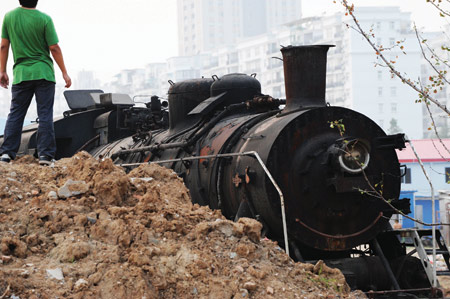Abandoned factories leaving a lethal legacy
Just one year after moving into their newly built apartments in Wuhan, Hubei Province, residents were shocked last month to hear that their lives were at risk, as the complex had been built on lands that had been contaminated by heavy industry pollution.
 |
|
A vacant site of an abandoned factory that manufactured machines for heavy industry in Wuhan, Hubei Province. Developers are building residential apartments on deserted factory sites across the country, raising safety concerns. |
The residential community had been built on the site of a deserted chemical plant. Land authorities had issued a construction permit before the area had been evaluated by the local environmental protection bureau.
Later environmental assessments show that the site has been contaminated with antimony, a metalloid that can cause irritation in the eyes, nose, throat and skin, and lead to heart attacks.
The case is by no means an isolated one, and highlights a worrying trend of residential projects being developed on land formerly used for heavy industry.
Heavy industrial bases in the country had previously been geared toward domestic markets and located in isolated inland areas for purposes of military security. However, over the years, that issue has become moot, as the goods that these bases produce are now aimed at the international market. Security considerations have given way to economic ones, and these bases now need to be located near coastal areas, where service and financial industries are more advanced.
This trend has resulted in an abundance of abandoned heavy industry bases that are now ticking time bombs. This was brought into sharp focus on July 28, when an explosion occurred in Qixia district in Nanjing, Jiangsu Province, as construction workers demolished an old chemical plant, causing 22 deaths and damaging more than 4,300 apartments.
Residential communities, elderly homes, kindergartens and a large furniture mall were all located within 300 meters of the abandoned plant. Eighteen people responsible for the accident were punished.
Changing times
"The case in Wuhan is a typical problem of the industrial shift," says Li Youhuan, director of the Comprehensive Development Research Center at the Guangdong Academy of Social Sciences. "How to deal with deserted factories is a key problem."
The flip side to this is the growing number of factories in developed areas. The Economic Information Daily published under the Xinhua News Agency reported earlier that 81 percent of chemical and petrochemical plants are located in areas that have high population densities.
Some petrochemical plants are located fewer than 100 kilometers from the city center, the report said.
In Qinzhou, Guangxi Zhuang Autonomous Region, construction of three residential areas is planned in locations just five to 10 kilometers away from petrochemical plants.
 0
0 







Go to Forum >>0 Comments